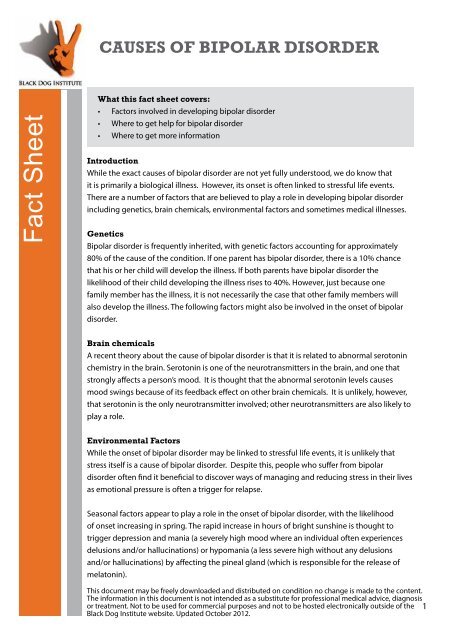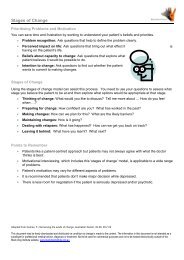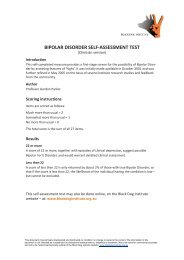Causes of bipolar disorder - Black Dog Institute
Causes of bipolar disorder - Black Dog Institute
Causes of bipolar disorder - Black Dog Institute
Create successful ePaper yourself
Turn your PDF publications into a flip-book with our unique Google optimized e-Paper software.
<strong>Causes</strong> <strong>of</strong> Bipolar DisorderFact SheetWhat this fact sheet covers:• Factors involved in developing <strong>bipolar</strong> <strong>disorder</strong>• Where to get help for <strong>bipolar</strong> <strong>disorder</strong>• Where to get more informationIntroductionWhile the exact causes <strong>of</strong> <strong>bipolar</strong> <strong>disorder</strong> are not yet fully understood, we do know thatit is primarily a biological illness. However, its onset is <strong>of</strong>ten linked to stressful life events.There are a number <strong>of</strong> factors that are believed to play a role in developing <strong>bipolar</strong> <strong>disorder</strong>including genetics, brain chemicals, environmental factors and sometimes medical illnesses.GeneticsBipolar <strong>disorder</strong> is frequently inherited, with genetic factors accounting for approximately80% <strong>of</strong> the cause <strong>of</strong> the condition. If one parent has <strong>bipolar</strong> <strong>disorder</strong>, there is a 10% chancethat his or her child will develop the illness. If both parents have <strong>bipolar</strong> <strong>disorder</strong> thelikelihood <strong>of</strong> their child developing the illness rises to 40%. However, just because onefamily member has the illness, it is not necessarily the case that other family members willalso develop the illness. The following factors might also be involved in the onset <strong>of</strong> <strong>bipolar</strong><strong>disorder</strong>.Brain chemicalsA recent theory about the cause <strong>of</strong> <strong>bipolar</strong> <strong>disorder</strong> is that it is related to abnormal serotoninchemistry in the brain. Serotonin is one <strong>of</strong> the neurotransmitters in the brain, and one thatstrongly affects a person’s mood. It is thought that the abnormal serotonin levels causesmood swings because <strong>of</strong> its feedback effect on other brain chemicals. It is unlikely, however,that serotonin is the only neurotransmitter involved; other neurotransmitters are also likely toplay a role.Environmental FactorsWhile the onset <strong>of</strong> <strong>bipolar</strong> <strong>disorder</strong> may be linked to stressful life events, it is unlikely thatstress itself is a cause <strong>of</strong> <strong>bipolar</strong> <strong>disorder</strong>. Despite this, people who suffer from <strong>bipolar</strong><strong>disorder</strong> <strong>of</strong>ten find it beneficial to discover ways <strong>of</strong> managing and reducing stress in their livesas emotional pressure is <strong>of</strong>ten a trigger for relapse.Seasonal factors appear to play a role in the onset <strong>of</strong> <strong>bipolar</strong> <strong>disorder</strong>, with the likelihood<strong>of</strong> onset increasing in spring. The rapid increase in hours <strong>of</strong> bright sunshine is thought totrigger depression and mania (a severely high mood where an individual <strong>of</strong>ten experiencesdelusions and/or hallucinations) or hypomania (a less severe high without any delusionsand/or hallucinations) by affecting the pineal gland (which is responsible for the release <strong>of</strong>melatonin).This document may be freely downloaded and distributed on condition no change is made to the content.The information in this document is not intended as a substitute for pr<strong>of</strong>essional medical advice, diagnosisor treatment. Not to be used for commercial purposes and not to be hosted electronically outside <strong>of</strong> the 1<strong>Black</strong> <strong>Dog</strong> <strong>Institute</strong> website. Updated October 2012.
<strong>Causes</strong> <strong>of</strong> Bipolar DisorderFact SheetMedical illnessMedical illness by itself is not a cause <strong>of</strong> <strong>bipolar</strong> <strong>disorder</strong>, but in some instances can causesymptoms that could be confused with mania or hypomania. Some medications and certainillicit stimulant drugs can also cause manic and hypomanic symptoms.PregnancyFor women who are genetically or otherwise biologically predisposed to developing<strong>bipolar</strong> <strong>disorder</strong>, the perinatal period can coincide with a first episode <strong>of</strong> <strong>bipolar</strong> <strong>disorder</strong>.See our Fact Sheet on Treatments for Bipolar Disorder During the Perinatal Period for moreinformation.What is the future for someone with <strong>bipolar</strong> <strong>disorder</strong>?Like any other medical condition such as heart disease or diabetes, <strong>bipolar</strong> <strong>disorder</strong> is anillness that requires careful management. While there is no known cure for <strong>bipolar</strong> <strong>disorder</strong>,the good news is that its severity and frequency <strong>of</strong> episodes can be well controlled,reduced or prevented with medication and other supports, such as psychological therapies.Where to get help for <strong>bipolar</strong> <strong>disorder</strong>?Bipolar <strong>disorder</strong> usually requires diagnosis and treatment by a psychiatrist. However, ifhelp has not previously been sought for <strong>bipolar</strong> <strong>disorder</strong>, the first step is to see a GeneralPractitioner. (GP). The GP will either conduct an assessment to establish whether theindividual has <strong>bipolar</strong> <strong>disorder</strong>, or refer the person to a psychiatrist who will conductthe assessment. The psychiatrist will develop a management plan in consultation withthe individual and possibly their GP. Depending on the nature <strong>of</strong> the illness, ongoingmanagement may be undertaken by the psychiatrist or by the GP, in consultation with thepsychiatrist. Psychological intervention is also recommended for the long-term management<strong>of</strong> <strong>bipolar</strong> <strong>disorder</strong>.Where to get more information• A Daily Mood Graph and other relevant Fact Sheets can be downloaded from ourwebsite at: www.blackdoginstitute.org.au/factsheets• Mastering Bipolar Disorder: an insider’s guide to managing mood swingsand finding balance, Kerrie Eyers & Gordon Parker (2008) Allen & Unwin• 1800 011 511 Mental Health Line is a NSW Government phone service operating24 hours a day, seven days a week and will provide a telephone triage assessment andreferral service staffed by mental health clinicians.<strong>Black</strong> <strong>Dog</strong> <strong>Institute</strong>Hospital Road, Prince <strong>of</strong> Wales Hospital, Randwick NSW 2031(02) 9382 4530 Email: blackdog@blackdog.org.auwww.blackdoginstitute.org.auThis document may be freely downloaded and distributed on condition no change is made to the content.The information in this document is not intended as a substitute for pr<strong>of</strong>essional medical advice, diagnosisor treatment. Not to be used for commercial purposes and not to be hosted electronically outside <strong>of</strong> the 2<strong>Black</strong> <strong>Dog</strong> <strong>Institute</strong> website. Updated October 2012.
















